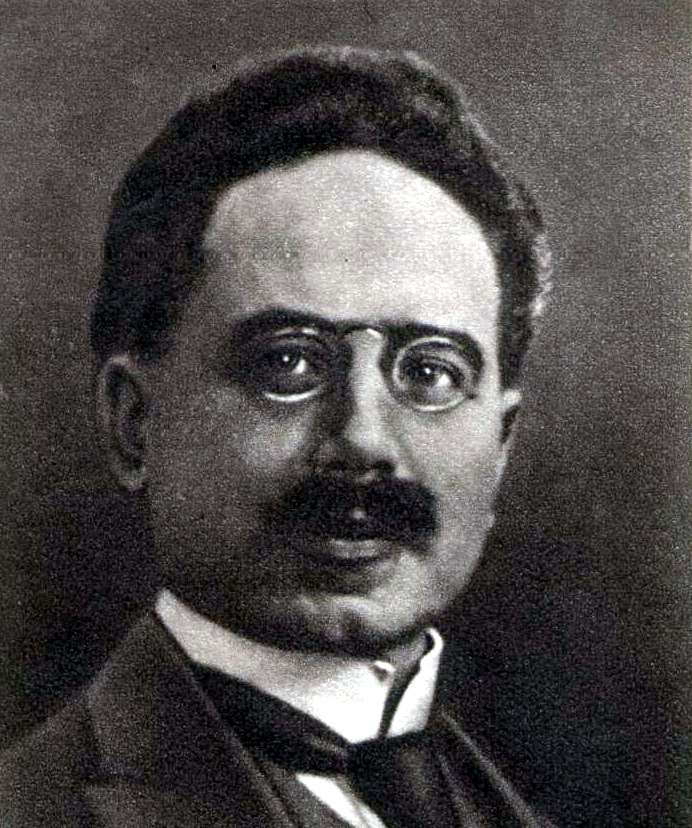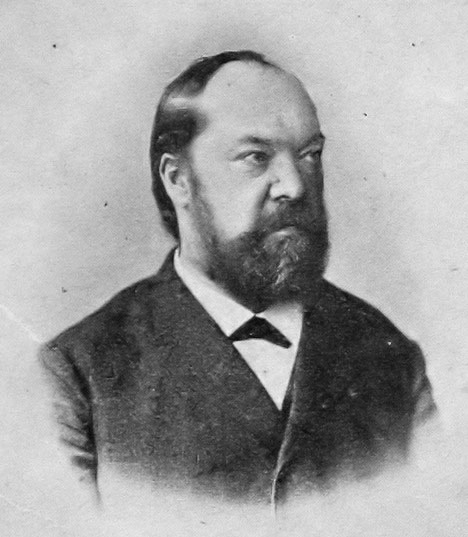|
Karl Wilhelm Stolle
Karl Wilhelm Stolle (19 December 1842 – 11 March 1918) was a German SPD politician and journalist. Life Karl Wilhelm Stolle was born into a Protestant family in the village of Frankenhausen, which today has become part of Crimmitschau, a short distance to the north of Zwickau. The "protestant" label appears to have been replaced with a "no religion" one fairly early on. His father was a building worker. After attending school locally, Stolle trained in horticulture. He travelled as a gardener's assistant across Germany, the Netherlands, Poland and Russia. Between 1862 and 1879 he owned a horticulture business at Crimmitschau. At the same time he was already active in the :de:Arbeiterbildungsverein, workers' education movement from the beginning of the 1860s. In 1866 Stolle joined the newly formed radical democratic Saxon People's Party, which following party mergers in 1869 made him a member of the new German :de:Sozialdemokratische Arbeiterpartei (Deutschland), Socia ... [...More Info...] [...Related Items...] OR: [Wikipedia] [Google] [Baidu] |
Anti-Socialist Laws
The Anti-Socialist Laws or Socialist Laws (german: Sozialistengesetze; officially , approximately "Law against the public danger of Social Democratic endeavours") were a series of acts of the parliament of the German Empire, the first of which was passed on 19 October 1878 by the Reichstag lasting until 31 March 1881 and extended four times (May 1880, May 1884, April 1886 and February 1888). The legislation gained widespread support after two failed attempts to assassinate Kaiser Wilhelm I of Germany by the radicals Max Hödel and Karl Nobiling. The laws were designed by Chancellor Otto von Bismarck with the goal of reversing the growing strength of the Social Democratic Party (SPD, named SAP at the time) which was blamed for inspiring the assassins. However, the laws caused the socialist movement to strengthen at times. This resulted in Bismarck dropping the laws and changing his coalition, eventually becoming an ally of his former enemies the Catholic Centre Party which appe ... [...More Info...] [...Related Items...] OR: [Wikipedia] [Google] [Baidu] |
1918 Deaths
This year is noted for the end of the World War I, First World War, on the eleventh hour of the eleventh day of the eleventh month, as well as for the Spanish flu pandemic that killed 50–100 million people worldwide. Events Below, the events of World War I have the "WWI" prefix. January * January – 1918 flu pandemic: The "Spanish flu" (influenza) is first observed in Haskell County, Kansas. * January 4 – The Finnish Declaration of Independence is recognized by Russian Soviet Federative Socialist Republic, Soviet Russia, Sweden, German Empire, Germany and France. * January 9 – Battle of Bear Valley: U.S. troops engage Yaqui people, Yaqui Native American warriors in a minor skirmish in Arizona, and one of the last battles of the American Indian Wars between the United States and Native Americans. * January 15 ** The keel of is laid in Britain, the first purpose-designed aircraft carrier to be laid down. ** The Red Army (The Workers and Peasants Red Army) ... [...More Info...] [...Related Items...] OR: [Wikipedia] [Google] [Baidu] |
1842 Births
__NOTOC__ Year 184 ( CLXXXIV) was a leap year starting on Wednesday (link will display the full calendar) of the Julian calendar. At the time, it was known as the Year of the Consulship of Eggius and Aelianus (or, less frequently, year 937 ''Ab urbe condita''). The denomination 184 for this year has been used since the early medieval period, when the Anno Domini calendar era became the prevalent method in Europe for naming years. Events By place China * The Yellow Turban Rebellion and Liang Province Rebellion break out in China. * The Disasters of the Partisan Prohibitions ends. * Zhang Jue leads the peasant revolt against Emperor Ling of Han of the Eastern Han Dynasty. Heading for the capital of Luoyang, his massive and undisciplined army (360,000 men), burns and destroys government offices and outposts. * June – Ling of Han places his brother-in-law, He Jin, in command of the imperial army and sends them to attack the Yellow Turban rebels. * Winter &ndash ... [...More Info...] [...Related Items...] OR: [Wikipedia] [Google] [Baidu] |
Communist Party Of Germany
The Communist Party of Germany (german: Kommunistische Partei Deutschlands, , KPD ) was a major political party in the Weimar Republic between 1918 and 1933, an underground resistance movement in Nazi Germany, and a minor party in West Germany in the postwar period until it was banned by the Federal Constitutional Court in 1956. Founded in the aftermath of the First World War by socialists who had opposed the war, the party joined the Spartacist uprising of January 1919, which sought to establish a soviet republic in Germany. After the defeat of the uprising, and the murder of KPD leaders Rosa Luxemburg, Karl Liebknecht and Leo Jogiches, the party temporarily steered a more moderate, parliamentarian course under the leadership of Paul Levi. During the Weimar Republic period, the KPD usually polled between 10 and 15 percent of the vote and was represented in the national and in state parliaments. Under the leadership of Ernst Thälmann from 1925 the party became thoroug ... [...More Info...] [...Related Items...] OR: [Wikipedia] [Google] [Baidu] |
Hugo Haase
Hugo Haase (29 September 1863 – 7 November 1919) was a German socialist politician, jurist and pacifist. With Friedrich Ebert, he co-chaired of the Council of the People's Deputies after the German Revolution of 1918–19. Early life Hugo Haase was born on 29 September 1863 in Allenstein, Province of East Prussia, East Prussia, Germany (now Olsztyn, Poland), the son of Jewish shoemaker and small businessman, Nathan Haase, and his wife Pauline (née Anker). After attending the ''Gymnasium'' at Rastenburg, Haase studied law in Königsberg (now Kaliningrad, Russia), joined the Social Democratic Party of Germany (SPD) in 1887 and the next year established himself as a lawyer. He was the first socialist lawyer in East Prussia and took on clients mainly from the lower classes (workers, peasants), journalists and socialist functionaries. In 1894, Haase became the first Social Democrat in the municipal parliament (''Stadtverordnetenversammlung'') of Königsberg. In 1897, he was electe ... [...More Info...] [...Related Items...] OR: [Wikipedia] [Google] [Baidu] |
Burgfriedenspolitik
(, ) is a German term that refers to the political truce between Germany's political parties during World War I. The trade unions refrained from striking, the Social Democratic Party (SPD) voted for war credits in the Reichstag, and the parties agreed not to criticize the government and its war. There were several reasons for the , among them the belief that it was their patriotic duty to support the government in war, fear of government repression if they protested against the war and fear of living under an autocratic Russian tsar more than the German constitutional monarchy and its kaiser, and hope to achieve political reforms after the war such as the abrogation of the inequitable three-class voting system by co-operating with the government. The only member of parliament of any party to vote against war credits in the second session was Karl Liebknecht. In the third session on 20 March 1915, Otto Rühle joined him. Over the course of the war, the number of SPD politic ... [...More Info...] [...Related Items...] OR: [Wikipedia] [Google] [Baidu] |
First World War
World War I (28 July 1914 11 November 1918), often abbreviated as WWI, was one of the deadliest global conflicts in history. Belligerents included much of Europe, the Russian Empire, the United States, and the Ottoman Empire, with fighting occurring throughout Europe, the Middle East, Africa, the Pacific, and parts of Asia. An estimated 9 million soldiers were killed in combat, plus another 23 million wounded, while 5 million civilians died as a result of military action, hunger, and disease. Millions more died in genocides within the Ottoman Empire and in the 1918 influenza pandemic, which was exacerbated by the movement of combatants during the war. Prior to 1914, the European great powers were divided between the Triple Entente (comprising France, Russia, and Britain) and the Triple Alliance (containing Germany, Austria-Hungary, and Italy). Tensions in the Balkans came to a head on 28 June 1914, following the assassination of Arch ... [...More Info...] [...Related Items...] OR: [Wikipedia] [Google] [Baidu] |
1912 German Federal Election
Federal elections were held in Germany on 12 January 1912.Dieter Nohlen & Philip Stöver (2010) ''Elections in Europe: A data handbook'', p762 Although the Social Democratic Party (SPD) had received the most votes in every election since 1890, it had never won the most seats, and in the 1907 elections, it had won fewer than half the seats won by the Centre Party despite receiving over a million more votes. However, the 1912 elections saw the SPD retain its position as the most voted-for party and become the largest party in the Reichstag, winning 110 of the 397 seats. Parties hostile or ambivalent to the ruling elites of the German Empire – the Social Democrats, the Centre Party, and the left-liberal Progressives – together won a majority of the seats. This allowed a successful vote of no confidence in the government of Theobald von Bethmann Hollweg over the Saverne Affair in 1913 and the Reichstag Peace Resolution of 1917. However, the Centre and the Progressives were unw ... [...More Info...] [...Related Items...] OR: [Wikipedia] [Google] [Baidu] |
Werdau
Werdau () is a town in Germany, part of the Landkreis Zwickau in Saxony. It is situated on the river Pleiße, 8 km from Zwickau. The town was mentioned as early as 1304, and in 1398 it was purchased by Frederick, then margrave of Meissen, who afterwards became Elector of Saxony. The textile industry was the dominant industry in Werdau since the 14th century. The industrial character of the town further increased in the 20th century with the large-scale truck production by the IFA conglomerate. Both industries were not competitive after the German reunification in 1990, leading to a sharp deindustrialisation. The character of the town changed dramatically over the last 20 years after almost all factories were demolished and the characteristic East-German residential Plattenbauten were scaled back. In 1905, the city held a contest for the design of a new town hall, as the old one built in 1727 had become too small. The tower and floorplan of one design was combined with th ... [...More Info...] [...Related Items...] OR: [Wikipedia] [Google] [Baidu] |
1881 German Federal Election
Federal elections were held in German Empire, Germany on 27 October 1881.Dieter Nohlen & Philip Stöver (2010) ''Elections in Europe: A data handbook'', p762 The Centre Party (Germany), Centre Party became the largest party in the Reichstag (German Empire), Reichstag, with 100 of the 397 seats, whilst the National Liberal Party (Germany), National Liberal Party, which had previously been the largest party, was reduced to 45 seats. Voter turnout was 56.3%.Nohlen & Stöver, p773 Results Alsace-Lorraine References {{German elections Federal elections in Germany 1881 elections in Europe, Germany 1881 elections in Germany Elections in the German Empire October 1881 events ... [...More Info...] [...Related Items...] OR: [Wikipedia] [Google] [Baidu] |





